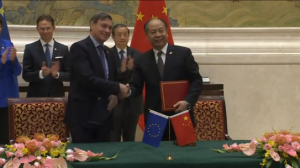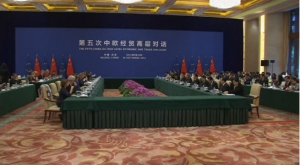
(Reuters) — China and the European Union (EU) agreed to deepen investment cooperation on Monday (September 28) during the 5th China-EU High Level Economic and Trade Dialogue.
Chinese Vice Premier Ma Kai and EU Vice President for Jobs, Growth, Investment, and Competitiveness, Jyrki Katainen, oversaw the signing of a joint declaration of cooperation for the development of 5G mobile phone networks and a memorandum of understanding between China’s National Development and Reform Commission and the European Union.
“The European Union side encouraged China to deepen its cooperation with the European Bank for Reconstruction and Development, including the launch of negotiations of China’s membership, according to the Bank’s current rules and procedures,” said Ma in a joint newser.

The bank was founded in 1991 to help rebuild countries in eastern and central Europe just emerging from communism after the fall of the Berlin Wall.
In June this year, Chinese Premier Li Keqiang pledged to invest in Europe’s new infrastructure fund, though he did not say how much China would spend. He also suggested the creation of an additional joint EU-China investment fund.
The pledges followed decisions by EU governments to join the Chinese-led Asian Infrastructure Investment Bank (AIIB).
It is expected to come with a request for return investment in China’s westward infrastructure drive – the “One Belt, One Road” initiative – constructing major energy and communications links across Central, West and South Asia to as far as Greece.
Katainen said that among the agreements the two sides reached, was one that established a joint work group for increased Chinese investment in the EU, and vice versa.
“And the first issue which we agreed (upon) today was a real breakthrough, because we wanted to, we agreed to set up a joint work group to increase cooperation between the EU and China,” said Katainen.
The group will “explore the opportunities for investment” for the Chinese, in investment platforms backed by the European Fund for Strategic Investment, Katainen added.
Despite the developments announced, Katainen said that China and the EU have yet to come to a direct bilateral investment agreement.
“The objective remains to deliver a truly comprehensive agreement, addressing all restrictions to investment, and ensuring a fair, open and transparent recruiter environment for investors both in the EU and in China,” he said.
The decision to invite China into an EU fund could cause some friction with Washington, which is wary of Beijing’s rising influence and upset that Europe rebuffed its calls to stay out of the AIIB.
China is already testing U.S. dominance in Latin America, offering the region $250 billion in investment over the next decade, while Chinese companies have poured money into Africa to guarantee commodity supplies in exchange for building new roads, hospitals and rail lines.
He did not provide further details about why no agreement was reached.
Later on Monday, Katainen and his delegation met with Chinese Premier Li Keqiang at the Zhongnanhai government complex.







